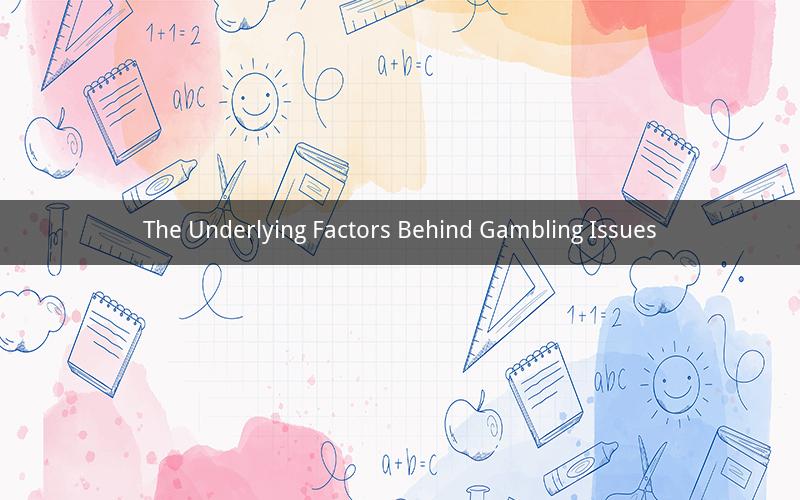
Gambling has been a prevalent issue in many societies, affecting individuals, families, and communities. Understanding what brings gambling issues into existence is crucial in addressing and preventing them. This article delves into the various factors that contribute to the emergence of gambling problems, including psychological, social, and environmental aspects.
1. Psychological Factors
a. Impulse Control Disorders
Individuals with impulse control disorders are more susceptible to developing gambling issues. These disorders, such as impulse buying disorder and pathological gambling, involve a lack of control over one's behaviors, leading to excessive gambling.
b. Mental Health Conditions
People with mental health conditions, such as depression, anxiety, and bipolar disorder, may turn to gambling as a form of escapism or self-medication. This can exacerbate their symptoms and lead to severe gambling problems.
c. Personality Traits
Certain personality traits, such as thrill-seeking, risk-taking, and sensation-seeking, may predispose individuals to engage in gambling. These traits make individuals more likely to seek out thrilling experiences, including gambling, which can lead to problematic gambling behaviors.
2. Social Factors
a. Family Environment
A family environment that encourages gambling or lacks proper supervision can contribute to the development of gambling issues. Children who grow up in households where gambling is common may be more likely to develop gambling problems later in life.
b. Peer Influence
Peer pressure and social dynamics can play a significant role in the development of gambling issues. Individuals may feel compelled to engage in gambling to fit in with their peers or to gain social status.
c. Media and Advertising
The portrayal of gambling in media and advertising can influence individuals to engage in gambling. The glamorous and exciting depiction of gambling in movies, television shows, and advertisements may make it seem more appealing and accessible.
3. Environmental Factors
a. Accessibility of Gambling Facilities
The proximity and availability of gambling facilities can contribute to the development of gambling issues. Individuals living near casinos, racetracks, or other gambling venues may be more likely to engage in gambling and develop problems.
b. Economic Factors
Economic downturns, unemployment, and financial stress can lead individuals to turn to gambling as a means of coping with their financial struggles. This can exacerbate gambling problems and lead to severe consequences.
c. Technological Advancements
The rise of online gambling has made it easier for individuals to access gambling opportunities. This increased accessibility can contribute to the development of gambling issues, as individuals may engage in gambling more frequently and for longer periods.
Frequently Asked Questions
1. Q: Can gambling issues be prevented?
A: Yes, gambling issues can be prevented through education, awareness, and early intervention. By promoting responsible gambling and addressing the underlying factors that contribute to gambling problems, individuals can be better equipped to avoid developing gambling issues.
2. Q: Are gambling issues more prevalent in certain age groups?
A: Yes, gambling issues are more prevalent in younger age groups, particularly those in their late teens and early twenties. This is due to the increased accessibility of gambling and the influence of peer pressure and social dynamics.
3. Q: Can mental health conditions be treated simultaneously with gambling issues?
A: Yes, mental health conditions can be treated concurrently with gambling issues. A comprehensive treatment plan that addresses both the mental health condition and the gambling problem is essential for successful recovery.
4. Q: How can I identify if someone has a gambling problem?
A: Signs of a gambling problem include secretive behavior, increased time spent gambling, neglecting responsibilities, borrowing money, and experiencing financial difficulties. If you suspect someone has a gambling problem, encourage them to seek help from a professional.
5. Q: Can gambling issues be resolved on one's own?
A: While some individuals may be able to resolve their gambling issues on their own, it is often more effective to seek help from professionals. Support groups, therapy, and counseling can provide individuals with the tools and resources needed to overcome their gambling problems.